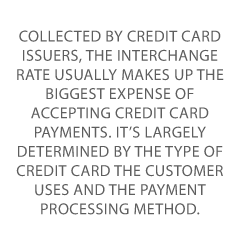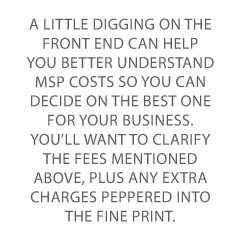As a business owner, accepting credit card payments can greatly improve the customer experience — it allows them to pay with a simple swipe, making it easier for them to spend money on your business. The problem is that doing so often triggers business expense fees for merchants.
Credit card processing fees generally range anywhere from 2.87% to 4.35% per transaction, And that doesn’t include additional merchant service provider fees that are usually sprinkled on top.
Minimizing these kinds of business expense fees can free up more money to direct toward managing and growing your business.
What are processing fees?
For consumers, fees associated with credit cards tend to center around late payments and transferring balances. Business owners on a tight budget, though, will likely find themselves contending with the following business expense fees:
Interchange rate
 Collected by credit card issuers, the interchange rate usually makes up the biggest expense of accepting credit card payments. It’s largely determined by the type of credit card the customer uses and the payment processing method.
Collected by credit card issuers, the interchange rate usually makes up the biggest expense of accepting credit card payments. It’s largely determined by the type of credit card the customer uses and the payment processing method.
Your merchant category code also comes into play, which tells credit card issuers what type of goods and services your business provides. Interchange rates can vary but typically range from 1.35% to 3.35% per transaction.
It may be partially determined by how many transactions you’re processing each day. Letting them build up and processing them all at once could lead to higher charges.
Assessment fee
This is an extra fee charged by credit card networks and usually ranges from 0.13% to 0.15%. It varies from card to card, but debit transactions are typically cheaper. The total cost of the transaction may also shape the assessment fee.
You may also face steeper business expense fees if processing an international transaction or the payment information is keyed in manually.
Merchant service provider (MSP) fees
An MSP can be a financial institution or other entity that provides credit card processing resources, like necessary hardware or software. This term casts a wide net, and fees can be very different from one provider to the next.
Square, for example, charges a standard processing fee of 2.6% + $0.10 per transaction, though it can be higher in certain situations. Some charge a monthly rate, while others tack on a flat fee.
Be sure to read the fine print so you understand the pricing structure and what’s included. For example, you might be charged an upfront fee for acquiring a credit card reader.
4 ways to minimize credit card processing fees
“Every penny counts for most small businesses,” says Matt Schulz, chief credit analyst at LendingTree. “Their financial margin for error is tiny, so the last thing you want to do is pay financial institutions any more than you have to.”
In that spirit, here are four ways to reduce your business’s credit card processing fees.
1. Pick the right plan for your business
 A little digging on the front end can help you better understand MSP costs so you can decide on the best one for your business. You’ll want to clarify the fees mentioned above, plus any extra charges peppered into the fine print.
A little digging on the front end can help you better understand MSP costs so you can decide on the best one for your business. You’ll want to clarify the fees mentioned above, plus any extra charges peppered into the fine print.
Flat-rate pricing, for example, could end up costing you more over the long haul — in part because interchange rates are variable. It’s also wise to zoom in on contract terms. Will you be locked into a restrictive long-term agreement?
“Don’t be afraid to shop around for a new merchant account provider if your current one isn’t willing to work with you,” says Schulz. “There are lots of options out there, and if you’re willing to invest a little time in comparison shopping, you might be able to save yourself some significant money. Just make sure that you won’t get stuck with a termination fee if you’re choosing to end a relationship with your provider.”
2. Ask for a fee reduction
If you’re generally happy with your MSP but are looking to cut costs, another option is to simply ask if they’ll reduce your processing fees.
“The bigger your business and the longer your track record with your merchant account provider, the more likely you probably are to get your way, but it can’t hurt for anyone to ask,” says Schulz. “Even a slight reduction in costs can be really significant to your business.”
3. Safeguard yourself against fraud
If someone fraudulently swipes a credit card at your business, the victim of that identity theft could turn around and dispute the charge with the credit card company. In 2021 alone, the Federal Trade Commission (FTC) received 2.8 million fraud reports.
If the consumer is successful, you’ll likely have to pay a chargeback fee — usually to the tune of $15 to $100. Fees like this can add up to a real expense. One potential solution is taking steps to reduce fraud.
Consider verifying each customer’s billing address during transactions. If processing an online order, tracking the delivery and requiring a signature from the recipient might also decrease the odds of theft or other sketchy behavior. Keeping accurate customer activity data can also help you spot fraudsters who repeatedly initiate chargebacks.
4. Offer incentives for alternative payment methods
Depending on your business, you may be able to incentivize paying in cash. Have a customer loyalty program? Perhaps cash purchases will earn them an extra stamp on their punch card. The idea is to get creative about how you entice customers to pay in cash.
Again, debit card transactions are often cheaper when compared to credit cards.
You might also tack on credit card surcharges as a way of discouraging that payment method. Check with your state first to clarify if it’s legal and if there are any protocols you need to follow.
For instance, Florida merchants are prohibited from charging credit card surcharges. Another option is setting a minimum purchase for credit card transactions. (FYI, this amount must be under $10.)
Business Expense Fees: Takeaways
No matter how you choose to cut costs, know that credit card processing fees are rarely set in stone.


